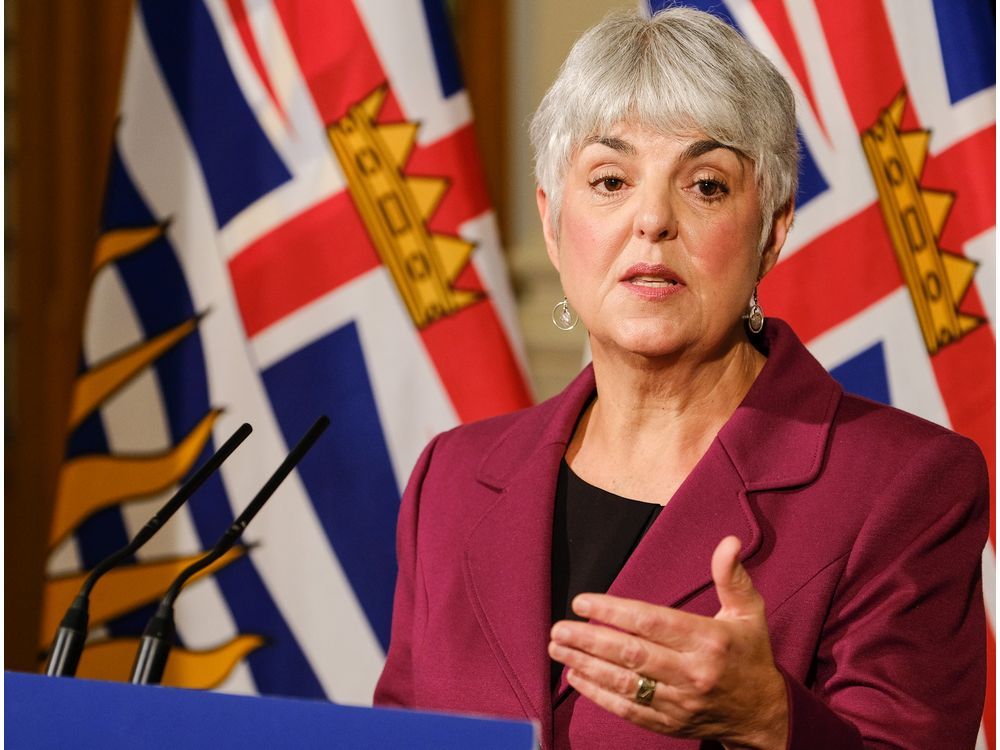Vaughn Palmer: Subdued James dials back B.C.'s fiscal forecast

Credit to Author: Stephen Snelgrove| Date: Wed, 11 Sep 2019 01:22:11 +0000
VICTORIA — Finance Minister Carole James started 2019 on a positive note, tabling a budget that increased her earlier growth forecast for what would be the second full year under the NDP.
James predicted the B.C. economy would grow by 2.4 per cent, almost half a point higher than the more cautious outlook she’d offered earlier.
She credited the upgrade to positive developments on trade, the decision by a consortium of investors to proceed with the multi-billion dollar LNG Canada project, and encouraging forecasts from private sector economists.
“We can be optimistic about how we chart our course from here,” she assured the legislature on Feb. 19, the day the budget was tabled.
But it was a more subdued James who met with reporters in the provincial capital on Tuesday for a quarterly update on the financial year that began April 1.
Gone was her 2.4 per cent growth forecast for this year and her almost-as-optimistic projection of 2.3 per cent for 2020.
James now predicts 1.7 per cent and 1.9 per cent respectively, for a scaling down in the forecast of more than a full point over the two years.
“The ministry’s lower forecast of economic growth in 2019 and 2020 largely reflects a decline in export activity, slower growth in retail sales and, to a lesser extent, weaker than anticipated home sales.”
By the numbers, retail sales were expected to increase by four per cent this year. The ministry now expects a more modest one per cent.
Home sales were expected to recover by three per cent this year, after dropping by 24 per cent in 2018. But upon reflection the ministry now expects another down year for sales, with a further reduction of 17 per cent.
The decline manifested in slumping returns from the property transfer tax, which brought in more than $2 billion in the year the New Democrats took office. James scaled down projected returns for this year to $1.4 billion.
She made no apologies, saying the New Democrats were willing to sacrifice short term revenues in order to drive down prices and make housing more affordable.
“I don’t think there is a British Columbian, particularly young people trying to get into the market, that would say we have hit affordability,” she told reporters. “There isn’t one change that will address the affordability crisis. There is not one tax, there is not one measure that will address it.”
More to come in other words and all that it may entail in terms of further impact on sales, revenue and the provincial bottom line.
James did record one positive uptick in the housing sector. After predicting a 17 per cent drop housing starts in February, she now expects roughly the same number of starts as last year, about 40,000. The ministry does expect a 20 per cent drop next year.
The finance minister acknowledged that another factor in the slower-than-expected growth figures was the succession of bad news in the forest sector.
“Top of mind, certainly, for all of us in government — and I think all of us in B.C. — are the mill closures and the challenges we’re seeing in the forest industry,” she conceded. “We know the forest industry is struggling.”
Nor was the impact of all those closures fully reflected in her latest update.
There were about six dozen announcements of closures and reduced operations at B.C. mills before the June 30 end of the first financial quarter.
But there have been another three dozen or so since then, including the shutdown announcement Tuesday by the Surrey-based Teal Jones Group. The news means the immediate layoff of some 300 logging contractors on Vancouver Island. Once inventories are exhausted, some 500 mill workers at two mills in Surrey will be affected as well.
While James blamed the decline in the forest sector on international markets, the pine beetle infestation and neglect under the B.C. Liberals, Teal Jones also singled actions under the NDP.
“Teal-Jones’ economics have been further negatively impacted by high stumpage rates and higher harvesting costs. Current stumpage rates remain high relative to lumber prices, and harvesting costs have been adversely impacted by new regulations to bring out more residual waste fibre. These negative factors have made it impossible for the company to continue operating its forest licenses economically.”
Another area of concern for James is ICBC. After losing more than $1 billion last year, the company maintains it is on track to come within $50 million of breaking even this year.
The Finance Ministry has its doubts. “There are still significant risks for ICBC,” James told reporters. “We’re certainly going to have to monitor it.”
One risk court challenges to the new rules for settling new claims, another the rising cost of settling past claims.
Still, for all the revisions, risks and concerns, James managed to keep the budget on track to end in a modest projected surplus of $179 million.
She did it by siphoning $300 million from the unused contingency fund. That left almost $1 billion in untapped funds in contingencies and an accompanying forecast allowance.
“We have a very careful, prudent approach to budget managing,” said the finance minister. “You’ll see that that will help us weather some of the economic storms that are coming.”
So far the incoming numbers don’t contradict her. But that could change if the outlook grows darker or the economy stalls altogether.